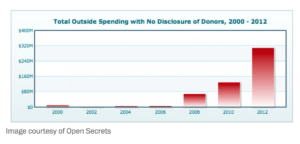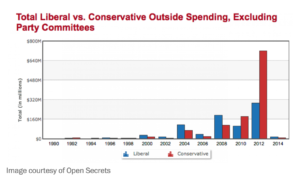Would a non-binding proposition to overturn Citizens United have any impact?
(And is that even something we should do?)
This year, California has a non-binding ballot initiative asking CA state lawmakers to do everything they can to overturn Citizens United via a constitutional amendment.  Many other states have had or currently have similar propositions on their ballot. In trying to figure out how to vote on this strange advisory initiative, I considered these factors:
- What has the impact been of Citizens United? Â (Is it all negative?)
- Is this proposition an effective way to try to overturn it?
- Are there other campaign finance reforms we should be focusing on instead?
- Should non-binding propositions be discouraged?
TL;DR: an amendment is not likely to be an effective approach for addressing the downsides of Citizens United, because amendments are way too hard to pass. It’s also difficult to craft well, and some organizations like the ACLU oppose such an amendment (others, like the L.A. Times, object to committing to an amendment without knowing the specifics). There are many other campaign finance reforms suggested that seem more plausible, and important. Additionally, this non-binding resolution seems unlikely to be all that effective at persuading CA lawmakers to shift much due to the current political situation.
IMPACT OF CITIZENS UNITED
What did Citizens United actually do, anyway? Â A few articles I found insightful and worth reading in full (they all to some extent reference the same data, but not entirely overlapping):
The Brennan Center released a very useful report in 2014 called Four Years After Citizens United: the Good, the Bad, and the Ugly:
[V]oters got a mega dose of negative ads (often of questionable veracity) paid for with untraceable dark money.  In 2010, over $135 million was dark. In 2012 the total jumped to over $300 million in dark money. The dark money trend is likely to repeat itself in the 2014 midterm. This means voters cannot tell who is trying to sway their vote. From the corporate point of view, investors can’t tell whether their corporation is funding politics.
(They don’t actually report any good effects of CU; they just report that new state legislation and federal policies are limiting its impact, although Congress and the Federal Elections Commission are failing to do anything.)
From the Washington Post (2014) — How Citizens United Changed Politics in 6 Charts. Â Charts show (among other things) that there is way more money being spent overall, way more money being spent by undisclosed sources, and a much higher increase of Republican spending relative to Democrats.
US News & World Report (2015) — How Citizens United has Changed Politics in 5 Years:
The result has been a deluge of cash poured into so-called super PACs… which are only nominally independent from the candidates they support. What’s more, the legal protections for corporations mean much of this spending, known as “dark money,” never has to be publicly disclosed….
Of the $1 billion spent in federal elections by super PACs since 2010, nearly 60 percent of the money came from just 195 individuals and their spouses, according to the Brennan Center report….
A Demos report released last week found winning Senate candidates in the 2014 races had to raise an average of $3,300 per day, every day, for six years, [and] focus on those donors who can provide large donations, to the detriment of their less wealthy constituents.”
I did find some people who argued that Super PACs are positive (I mostly did not find their arguments compelling, but I admit I was skimming). And the ACLU has a nuanced pro-CU view that argues about the dangers of limiting speech and suggests alternatives:
That decision has sparked a great deal of controversy. Some see corporations as artificial legal constructs that are not entitled to First Amendment rights. Others see corporations[, non-profits,] and unions as legitimate participants in public debate whose views can help educate voters as they form their opinions on candidates and issues.
We understand that the amount of money now being spent on political campaigns has created a growing skepticism in the integrity of our election system that raises serious concerns. We firmly believe, however, that the response to those concerns must be consistent with our constitutional commitment to freedom of speech and association. For that reason, the ACLU does not support campaign finance regulation premised on the notion that the answer to money in politics is to ban political speech.
At the same time, we recognize that the escalating cost of political campaigns may make it more difficult for some views to be heard, and that access to money often plays a significant role in determining who runs for office and who is elected.
In our view, the answer to that problem is to expand, not limit, the resources available for political advocacy. Thus, the ACLU supports a comprehensive and meaningful system of public financing that would help create a level playing field for every qualified candidate. We support carefully drawn disclosure rules. We support reasonable limits on campaign contributions and we support stricter enforcement of existing bans on coordination between candidates and super PACs.
IMPACT OF NON-BINDING RESOLUTION
This may send some kind of important signal to our lawmakers to try to fix Citizens United, but I am skeptical. I’ve gotten a little less skeptical, because 16 (or more?) other states have already approved similar measures, and a petition with 3M signatures was delivered to Congress — so lawmakers may actually be feeling the heat from their constituents.  Democratic California lawmakers are probably going to do their best to fight CU, regardless — both Senatorial candidates endorsed voting yes.  It’s unclear whether this will sway Republicans, but in districts where the lawmakers are not inclined to overturn Citizens United, strong pressure from constituents may make some difference.
Say that lawmakers do heed a yes vote — is it plausible a constitutional amendment could pass?  It seems really unlikely to work:
Passing a constitutional amendment is a daunting assignment.  A two-thirds vote of approval would be required in both the U.S. House and U.S. Senate, which often can’t achieve simple majorities on seemingly perfunctory matters. And then, three-fourths (38) of the nation’s states would have to ratify an amendment.  The last time this occurred it took 203 years….
The alternative would be a constitutional convention, which is even less likely. Two-thirds of the states would have to demand it. It’s happened exactly once in U.S. history — and that was the first one that created the Constitution….
An amendment, says law professor and campaign finance expert Rick Hasen of the University of California at Irvine, isn’t realistic, at least not in the current environment.
“It’s a political non-starter,†he said, pointing to the Democracy for All Amendment, which did not receive a single Republican vote.
And it’s not even necessarily a good idea. Â Â The L.A. Times expresses major concerns about trying for a Constitutional amendment:
First, amending the Constitution is a difficult process by design, and not every unwise Supreme Court decision justifies the attempt….  We don’t rule out supporting an appropriately crafted constitutional amendment in the future, but we see no reason to rush.
That brings us to our second concern about Proposition 59: Like a similar measure approved by Los Angeles city voters in 2013, Proposition 59 doesn’t specify what a proposed constitutional amendment would actually say.
True, Proposition 59 suggests that an amendment or amendments would reverse Citizens United and “other applicable judicial precedents†— a reference mainly to Buckley vs. Valeo, a 1976 decision holding that individuals could spend unlimited amounts of their money on independent political expenditures. But the measure also suggests that a constitutional amendment would “make clear that corporations should not have the same constitutional rights as human beings.â€
That’s a powerful, even poetic, pronouncement, but what does it mean? Would corporations lose only free-speech rights or other rights as well, such as the right to be free from unreasonable searches and seizures at their places of business or to due process of law if they were sued? Would nonprofit as well as for-profit corporations be affected? What about the 1st Amendment rights of corporations that publish newspapers or broadcast the nightly news?
I was unable to find any historical studies of the impact of non-binding state ballot initiatives in general.
ALTERNATIVE REFORMS
Campaign finance reform — and Citizens United reform — needn’t involve a Constitutional amendment. Â The L.A. Times again:
Citizens United, which was decided only six years ago by a mere 5-4 majority, could plausibly be reconsidered or narrowed with a change in the court’s membership. Hillary Clinton, for one, has made it clear that she would appoint justices likely to reconsider the ruling. (She also says she would fight for a constitutional amendment to overturn the ruling “if necessary.â€)
Even if it weren’t overturned, many of the evils for which it has become a metaphor — undisclosed “dark money†in political campaigns, for example — can be addressed by simple legislation.
To repeat the ACLU’s platform:
the ACLU supports a comprehensive and meaningful system of public financing that would help create a level playing field for every qualified candidate. We support carefully drawn disclosure rules. We support reasonable limits on campaign contributions, and we support stricter enforcement of existing bans on coordination between candidates and super PACs.
Specific options from the Brennan report:
Some would go for modest requirements like a new rule at the SEC to require transparency from politically active public companies. This proposal has gained the support of nearly 700,000 public comments at the SEC, but the Commission has yet to act.
Some would try more ambitious reforms like adopting the U.K.’s approach to corporate political spending by requiring shareholder votes before a company can spend in an election. This approach is embodied in the Shareholder Protection Act, which has been introduced in Congress for the third time.
Others focus more on bolstering the tools that candidates need to stay competitive in the new cash soaked environment, including expanded public financing. On the heels of corruption scandals in Albany, New York’s state legislature came tantalizingly close to passing a public financing bill in 2013. In the wake of this defeat, Gov. Andrew Cuomo appointed the Moreland Commission to Investigate Public Corruption. The Commission suggests public financing as a solution.
On the other hand, an amendment is not mutually exclusive with these other options — but might divert energy/attention/funding.
DOWNSIDESÂ OF NON-BINDINGÂ INITIATIVES
Some newspapers, like the Ventura County Star, are urging people to not vote on this initiative at all — because the CA ballot is already too long, and non-binding initiatives are wasteful, pointless, and should not be encouraged. The OC Register agrees:
[H]aving advisory measures such as this clutters and complicates the ballot, and that anyone who doesn’t want a future in which every election has similar nonbinding, time-consuming measures should vote no. SB 1272, the 2014 measure that led to Proposition 59, became law without Gov. Jerry Brown’s signature after he touted the Legislature’s “commitment†but criticized ballot “clutter.â€
We share his concern. A yes vote isn’t just taking a symbolic but meaningless stand against a 6-year-old court decision. It’s an invitation to political strategists to aggressively push future symbolic measures onto already-crowded ballots. No thanks.
I was unable to find any data (read: didn’t really research, in this case :) ) on whether such measures are actually proliferating, and whether there’s a causal connection between people voting yes/no and such an increase.


